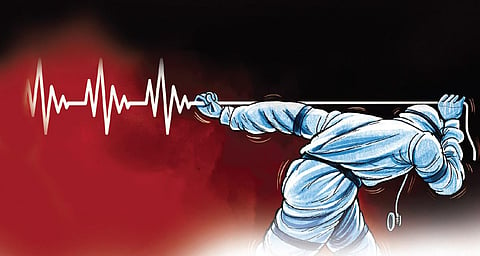

THIRUVANANTHAPURAM: The health department plans to actively monitor the Covid patients in home isolation after it has been found that even those in the high-risk category skip timely treatment.
It has issued guidelines to use the nearest public health centres (PHCs) to monitor the conditions of the patients under home care with the help of timely blood sample investigations.
The delay in approaching hospitals is resulting in complications and deaths, thereby putting a question mark on the home care system which has helped in preventing the patient load in hospitals.
The department made the plan as part of reducing the mortality rate.
The state has been encouraging home care for Covid patients and over 90% of the people infected are in home isolation. But it has also raised concern as home isolation resulted in infecting other members in the family.
The new guidelines also assume significance after a central team dispatched to monitor the Covid situation in the state reported negligence in the monitoring of Covid patients in home isolation.
The new plan involves PHCs to ensure blood investigations to check the severity of disease and it is done by checking inflammation, clots, signs of damage to body tissues and the body’s capacity to use oxygen.
“Blood investigations should be done on the seventh day from the onset of symptoms to identify progression to the hyperinflammatory stage in patients with high-risk factors who continue to be in home care. Those without risk factors in home care but with fever for more than five days should also be facilitated to do blood investigations and get hospitalised,” said the new guidelines.
However, health experts pointed out practical difficulties in implementing the new guidelines.
Indian Medical Association state secretary Dr Gopikumar P said people take the risk of avoiding treatment even if they belong to the riskier category. According to him, the delay has contributed to some of the Covid deaths in the state.
”We have effectively implemented home isolation in the first and second waves of Covid. Though the system has been effective in treatment in 85% of the cases, there are riskier categories of people who approach the hospital only after their condition worsens. By then, we lose the crucial time to treat the disease. There are also practical difficulties in the collection and testing of blood samples. The resources should be improved to effectively implement the guidelines,” said Kerala Government Medical Officers’ Association (KGMOA) president G S Vijayakrishnan.There are only a few government labs that conduct tests such as D-dimer (to detect the presence of blood clot).
New guidelines
PHCs empowered to monitor home care monitoring clusters.
Blood tests on high-risk patients for inflammation, clots, signs of damage to body tissues and capacity of body to use oxygen on seventh day from onset of symptoms.
Blood investigation for those without high risk if fever lasts for more than five days.
Those with risk factors should be encouraged to get hospitalised.
Limitations
Lack of resources in collecting and testing samples of people in peripheral areas.
Testing facilities concentrated at district headquarters.
Large number of samples sent from peripheral areas would result in delay in results.
Testing costly Rs 2,000-3,000) at private labs.
Challenges
Lax home isolation causes further spread within families.
Reluctance to get tested, seek treatment.